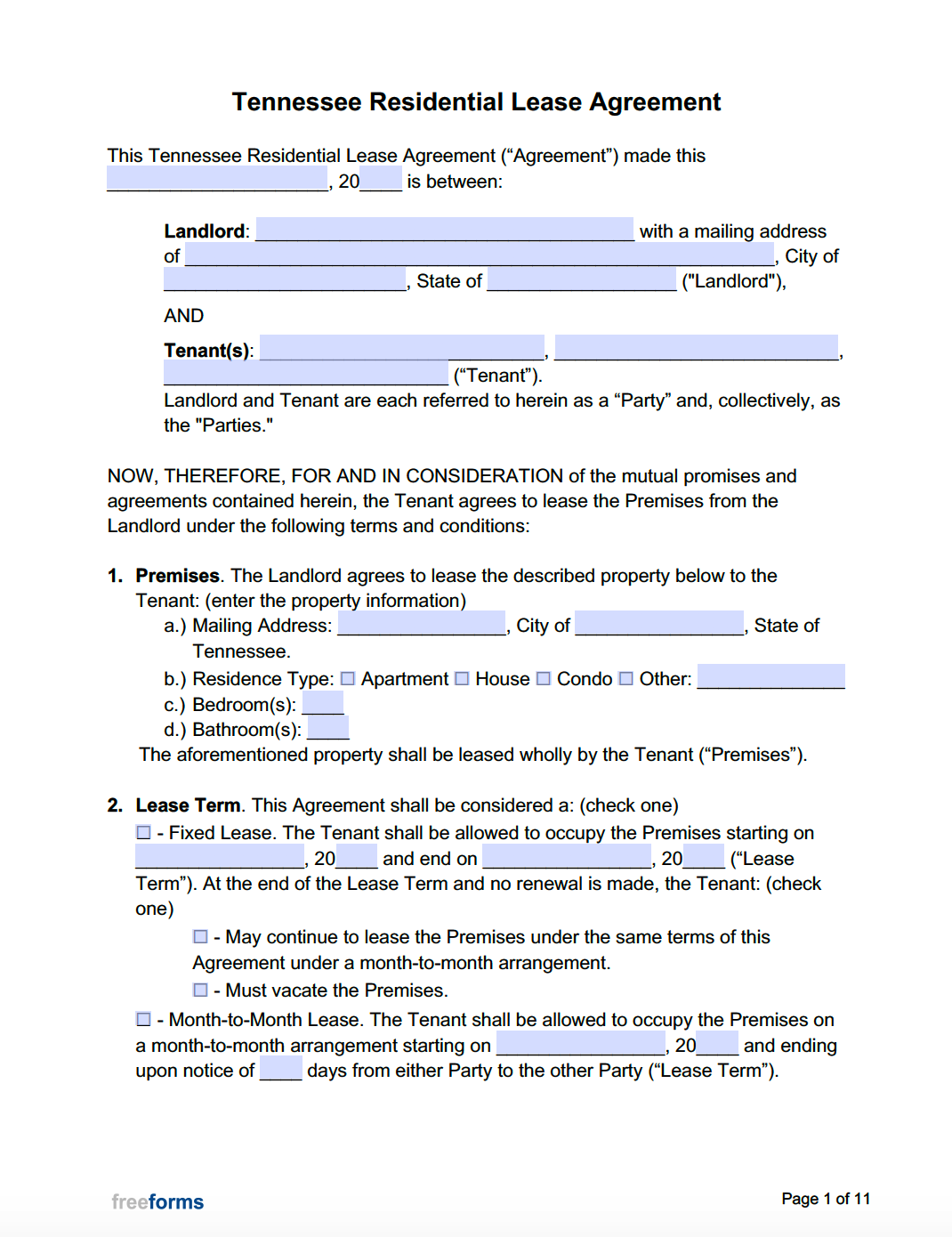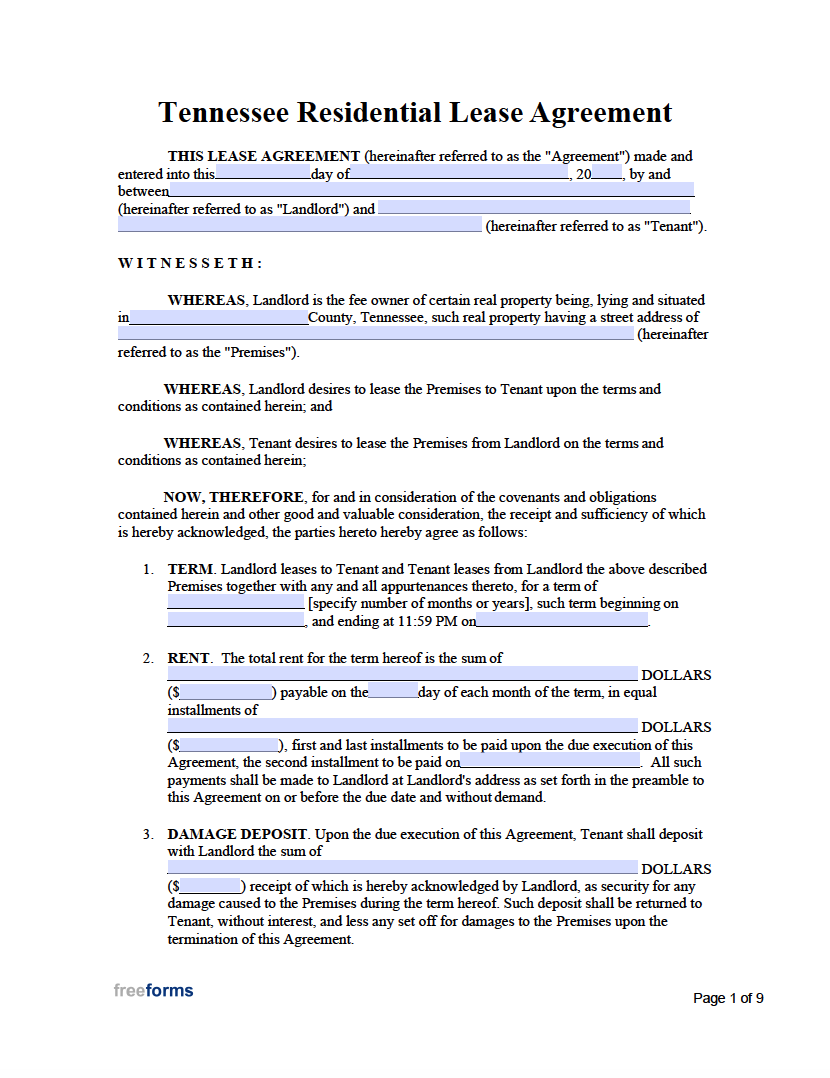The One Thing Your Rental Agreement Template Tennessee Is Missing
Landlords in Tennessee, are you confident your rental agreement template is legally sound and protects your interests? While many templates cover the basics – rent amount, lease term, and tenant responsibilities – one crucial element is often overlooked: a robust and specific clause addressing property damage and repairs. A poorly defined or missing clause can lead to costly disputes, lengthy legal battles, and significant financial losses. This article will highlight the critical need for detailed damage and repair provisions in your Tennessee rental agreement and offer guidance on how to strengthen your template.
Beyond the Basics: Why Detailed Damage and Repair Clauses are Essential
A generic statement about the tenant’s responsibility for damages is insufficient. Tennessee law, while generally favoring landlords in cases of tenant-caused damage, requires clear and specific language to ensure enforceability. Without it, you risk ambiguity and difficulties in proving negligence or intentional damage. A well-drafted clause protects both you and your tenant by:
- Clearly defining “normal wear and tear”: This prevents disputes over minor, expected damage resulting from ordinary use. Specify what constitutes normal wear and tear (e.g., minor paint chips, slight carpet fading) versus damage requiring repair or replacement.
- Outlining the tenant’s responsibilities: State explicitly that the tenant is responsible for all damages beyond normal wear and tear. Include examples such as damage caused by pets, intentional destruction, or negligence.
- Detailing the repair process: Specify the timeframe for reporting damage, the tenant’s cooperation in repairs, and the process for obtaining quotes and approvals.
- Addressing security deposits: Clearly state how the security deposit will be used to cover damages, including the process for returning the deposit after accounting for repairs.
- Protecting against liability for pre-existing conditions: Document the property’s condition thoroughly before the tenant moves in, preferably with photos and a detailed inventory checklist. This prevents future disputes over pre-existing damage.
What to Include in Your Damage and Repair Clause
Your Tennessee rental agreement should include a detailed clause addressing:
- Definition of “damage”: A clear definition that distinguishes between normal wear and tear and actual damage.
- Tenant’s obligation to report damage: Specify a timeframe (e.g., within 24-48 hours) for reporting any damage.
- Tenant’s obligation to repair (or pay for repairs): Clearly state the tenant’s responsibility to repair damage or compensate the landlord for the cost of repairs.
- Landlord’s right to enter the premises for inspections: Outline the landlord’s right to conduct reasonable inspections and the required notice to the tenant.
- Security deposit application: Detail how the security deposit will be applied towards repairs.
- Dispute resolution process: Include a clear process for resolving disputes regarding damage and repairs, potentially mentioning mediation or arbitration.
Strengthening Your Tennessee Rental Agreement Template
Don’t rely on generic online templates. Consulting with a Tennessee real estate attorney is highly recommended to ensure your rental agreement complies with all state and local laws and effectively protects your interests. A customized agreement, incorporating the above suggestions, offers significantly better protection than a generic template. Remember, a well-crafted rental agreement is a proactive measure that can save you significant time, money, and stress in the long run.
Conclusion
A comprehensive damage and repair clause is the missing piece in many Tennessee rental agreement templates. Failing to address this critical aspect can expose landlords to significant financial and legal risks. By incorporating a detailed and legally sound clause, you can protect your investment, streamline the tenant-landlord relationship, and minimize potential disputes. Prioritize creating a robust and customized rental agreement to safeguard your property and your peace of mind.
FAQs
Q1: Can I deduct repairs from the security deposit without providing the tenant with a detailed accounting? No. Tennessee law requires landlords to provide tenants with a detailed accounting of any security deposit deductions within 30 days of the tenant vacating the premises.
Q2: What if my tenant refuses to pay for damage they caused? You may need to pursue legal action to recover the costs of repairs. Documenting the damage with photos and a detailed record of communication with the tenant is crucial.
Q3: What constitutes “reasonable wear and tear”? This is subjective and depends on the age and condition of the property. Your rental agreement should clearly define what is considered reasonable wear and tear. It’s best to create a detailed move-in/move-out inspection report with photos.
Q4: Do I need a lawyer to create a rental agreement? While not strictly required, it is highly recommended, especially for landlords with multiple properties or complex situations. A lawyer can ensure your agreement complies with all applicable laws and protects your rights.
Q5: Where can I find more information about Tennessee landlord-tenant laws? The Tennessee Attorney General’s website and the Tennessee Code Annotated are excellent resources for information on landlord-tenant laws.




